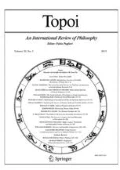Abstract
According to Fred Dretske’s semantic information theory, the process of becoming informed consists of two parts: the transfer of information via a channel, and the subsequent formation of a semantic structure, called ‘digitalisation’. Leaving out any one of the two parts renders the concept of becoming informed incomplete. Similarly, Peter Menzies and Huw Price’s agency-account of causation has a bipartite structure. The account posits that an event A is a cause of a distinct event B in cases where bringing about the occurrence of A would be an effective means by which a free agent could bring about the occurrence of B. A major problem for this approach seems to be that the analysis contains two occurrences of ‘bringing about’, which might be taken for causal notions that would render the formula circular. However, applying two different interpretations to each of the occurrences yields a non-circular analysis of causation. These interpretations entail a conceptual structure of causation that is analogous to Dretske’s analysis of becoming informed. Building on this conceptual foundation, it can be shown that informational and causal views on events can be integrated into a combined account, according to which information channels and causal mechanisms are identical. Digitalisation and direct action are parts of causation by information, a concept that further binds becoming informed and causation to each other. Causation by information is relevant because it helps us make sense of the seeming contradiction of construing some events as actions, while at the same time allowing them to be effects of causes.
Similar content being viewed by others
Notes
In the literature on causation, both expressions can be observed to be used for the same thing, e.g. James Woodward usually talks about the ‘semantic problem’, whereas Stuart Glennan uses the term ‘conceptual problem’, and both authors contrast this with epistemological and metaphysical problems of causation.
To avoid confusion, I use the contrastive pairings of ‘sender’ and ‘recipient’, when agents communicating via a channel are concerned, and ‘source’ and ‘receiver’, understood as correlated events that are connected by a channel.
Dretske does not use the denotation ‘contingent matters of fact’ literally, but it is adequate for the kinds of fact that his theory describes; therefore, I am going to use this denotation henceforth.
This is not to be confused with the ordinary meaning of that word, as the subsequent definitions show.
The aforementioned qualifications concerning the normativity of this approach apply.
‘Plan an action’ is, in this context, to be understood as explicitly planning an action, such that the plan of action can be justified and explained to others. This is to make sure that the agent possesses at least an intuitive concept of causation and can be prompted to utter his causal beliefs about the situation. Understood in this way, planning and explaining match each other.
As it is usual practice in the literature on causation, I abstract from the differences between objects and events if they are considered as causal relata.
This is the crucial difference between the agency approach and the objective interventionist approaches. The license to judge that the causal influence comes from A comes from the fact that A is the intervening agent’s direct object! Who vouches for this concerning the intervention of objective interventionism?
Interestingly, on page 193, Menzies and Price (1993) cite the fact that it is a virtue of agency theories to account for the fact that an agent can err in his judgement. But this remark of theirs suggests a conceptual reading of their solution, rather than clarifying the ‘metaphysics’ of causation. The underlying conflation of conceptual and metaphysical problems, however, seems to be quite common in the literature of causation. I’m not sure whether this is due to a diluted notion of ‘metaphysical’, or an ontologically over-committed notion of ‘conceptual’.
If the mechanism conflates two kinds of causes into one effect, the condition of non-equivocation of an information channel is not satisfied. So, to be precise, mechanisms that are also information channels with respect to a set of possible causes must satisfy this structural condition.
But it must be remembered that the channel view can be imposed at any stage, so the difference is only at the conceptual, not the ontological level!
I use the two terms ‘efficient causation’ and ‘mechanistic causation’ interchangeably when contrasting them with causation by information. The question of whether a pan-mechanistic view of causation is justified or not is not the point of this essay.
References
Bogdan R (1988) Information and semantic cognition: an ontological account. Mind Lang 32:81–122
Dennett DC (1987) The intentional stance. MIT Press, Cambridge
Dennett DC (1991) Consciousness explained. Little, Brown & Company, Boston
Dretske F (1981) Knowledge and the flow of information. MIT Press, Cambridge
Floridi L (2008) The method of levels of abstraction. Mind Mach 18(3):303–329
Floridi L (2010) The philosophy of information. Oxford University Press, Oxford
Menzies P, Price H (1993) Causation as a secondary quality. Br J Philos Sci 44:187–203
Pearl J (2000) Causality. Cambridge University Press, Cambridge
Psillos S (2002) Causation and explanation. Acumen, Chesham
Shannon C (1949) The mathematical theory of communication. University of Illinois Press, Urbana
Woodward J (2003) Making things happen—a theory of causal explanation. Oxford University Press, Oxford
Woodward J (2009) Agency and interventionist theories. In: Beebee H, Hitchcock C, Menzies P (eds) The Oxford handbook of causation. Oxford University Press, Oxford, pp 234–262
Author information
Authors and Affiliations
Corresponding author
Rights and permissions
About this article
Cite this article
Schulz, C. An Informational Perspective on Agency Causation. Topoi 35, 241–252 (2016). https://doi.org/10.1007/s11245-014-9255-6
Published:
Issue Date:
DOI: https://doi.org/10.1007/s11245-014-9255-6




